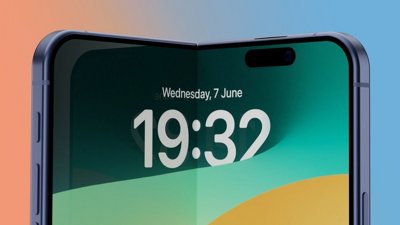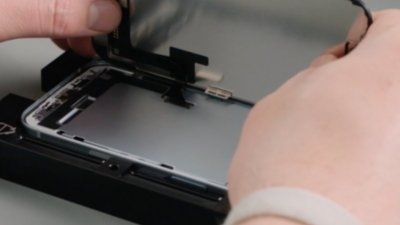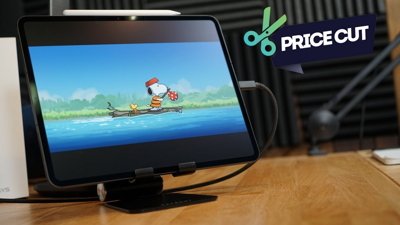The Financial Accounting Standards Board sets accounting standards for U.S. public companies, a power designated to the private, not-for-profit group by the Securities and Exchange Commission. According to Fortune Brainstorm Tech, the FASB has drafted a new rule that Apple heavily lobbied for — a rule that one analyst told AppleInsider could influence the company's stock price.
"If the rule goes through, we believe Apple will be able to defer the iPhone revenue in a less dramatic manner," Piper Jaffray Senior Research Analyst Gene Munster said. "This could meaningfully alter the reported, GAAP-based revenue numbers in future quarters and the change would likely be a positive for the stock."
Under the current rules, Apple was forced to use "subscription accounting" in its iPhone-related filings — a requirement that some believe masked the true profitability of the handheld device. The new rule is currently only in draft form, but if approved, history suggests it could cause dramatic increase on AAPL stock price.
"Subscription accounting meant that Apple has been under-reporting earnings on its bestselling smartphone for two years — one of the factors, Apple bulls believe, that kept its share price from fully reflecting the success of one most profitable products Apple has ever made," the report said.
Author Philip Elmer-DeWitt goes on to cite the hardware maker's third-quarter financial results. Though Apple reported profits of $1.35 per diluted share for the period ending June 27, its earnings per share under the non generally accepted accounting principles would have been $2.14 a share, a total nearly 60 percent higher.
The issue has existed for some time, and led some analysts to comment on what they called Apple's "real" quarterly earnings.
"At the heart of the problem for Apple is its decision to offer iPhone owners free software updates from time to time — a practice that required its accountants to spread the revenue from iPhone sales over the life of a cellphone contract, typically two years," Elmer-DeWitt said.
Apple has cited the generally accepted accounting principles (GAAP) as its reasoning for charging customers nominal fees for various upgrades, such as the iPod touch and Airport Extreme. Because Apple gives its iPhone software updates away for free, though, the Cupertino, Calif., company is required to spread its iPhone revenue over the length of the cell phone contract, which is usually two years.
Because of this, in August, Apple wrote to FASB Chairman Russell Golden in support of changing the rules. In the note, Betsy Rafael, Apple's vice president and corporate controller and principal accounting officer, said the current requirements to not accurately reflect the real economics of transactions. The proposed changes, they said, would address those issues.
"(The changes)... will result in a more accurate reflection of an entity's economic activities," wrote Rafael, "and in less complex and more transparent financial information that will better serve investors, financial analysts, and other users of financial statements."
 Neil Hughes
Neil Hughes
-m.jpg)






 Andrew Orr
Andrew Orr
 Malcolm Owen
Malcolm Owen

 William Gallagher
William Gallagher


 William Gallagher and Mike Wuerthele
William Gallagher and Mike Wuerthele
 Christine McKee
Christine McKee


-m.jpg)






25 Comments
So the software updates aren't the issue at all then, the issue is the cellphone contract.
The market knows what Apple's non-GAAP real earnings are and the stock has priced that in. The non-GAAP PE is around 20 on a run rate basis. It is ok for a company that has grows revenues at 12% and earnings at 15% - under the current economic conditions.
What can raise the pricing in the stock is the expansion of carriers that carry the iPhone, like adding multiple carriers in the same market. Like adding Verizon, Sprint, T-Mobile in the US. Adding China Mobile in China, etc. As their experience in France has shown, market share can double. The big expansion in the iPod market share too place when Apple went from Mac iTunes to PC iTunes... increased the addressable market.
New products can make a difference. Adding a nice autofocus zoom camera and a decent GPS to the iTouch would help, but I suspect that Apple wants that market left to the iPhone. A well designed Table PC can help too in the educational market.
However, the iPhone is the real killer product... just needs to be turned loose across multiple carriers.
So does this mean if the rule passes Apple will no longer charge for iPod Touch updates? and misc other firmware updates they have 'had to' charge for in the past due to the accounting?
So does this mean if the rule passes Apple will no longer charge for iPod Touch updates? and misc other firmware updates they have 'had to' charge for in the past due to the accounting?
I'd think the opposite... that they would charge for iPhone updates, since the accrual would no longer be over 2 years... same as for touch.
This is nothing but another accounting game that most publicly traded companies use to mask performance that only benefit them.
Whether the income is reported once or spread over time, what matters is how much cash you deposit in your bank. Cash is king. GAAP or non-GAAP is just nothing but an accounting gimmick!